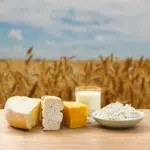Erev Shavuot is a Jewish holiday celebrated on the night before the sixth day of the Hebrew month of Sivan and generally falls between May 15 and June 14 on the Gregorian calendar and directly translates to “Eve of the Feast of Weeks.” This year it falls on May 22 . The holiday has both an agricultural significance and a biblical one. Agriculturally, it marks the wheat harvest, and biblically, it marks the giving of the “Torah” (a compilation of the first five books of the bible) to the Israelites on Mount Sinai. Erev Shavuot also marks the end of the counting of the Omer, a 49-day, or seven-week, count between Passover and Shavuot.
History of Erev Shavuot
Erev Shavuot is as old as the time of Moses in the bible. It marks the revelation of the Torah to Moses and the Israelites on Mount Sinai and occurred 50 days after Passover when the people of Israel were freed from their enslavement to Pharoah in Egypt. Shavuot happened in 1314 B.C. Shavuot allows believers to renew their faith and acceptance of the gift of the Torah, which God blessed them with
It is one of the biblically ordained three Pilgrimage festivals traditionally celebrated in Israel for one day, where it is a public holiday, and for two days abroad. It is sometimes referred to as Pentecost by the Jewish due to its timing after Passover. Pentecost, meaning ‘fifty’ in Greek, occurs 50 days after the first day of Passover. However, it is not the same as the Christian Pentecost, which signifies the descent of the holy spirit on Jesus’ disciples.
Over the years, the celebration has had many names, namely, “The Festival of Weeks,” “The Festival of Reaping,” and “The Day of First Fruits.” Shavuot and Passover share many customs. “Matza,” which is unleavened bread made out of the first barley crop, is used to celebrate Passover. This bread plays a significant role in Shavuot. With the agricultural significance of the celebration, Jews often “bring the outdoors indoors” by decorating their houses with flowers and other green plants. It is also celebrated by staying up all night to study and prepare for the revelation of the Torah. It is commonly referred to as the Shavuot night watch.
Erev Shavuot timeline
Moses receives the Torah on Mount Sinai.
The journey to the promised land begins as Moses leads the people of Israel out of Egypt.
Yemenite Jews scribe the Torah onto a scroll.
Jews all over the World celebrate Erev Shavuot.
Erev Shavuot FAQs
What are the symbols of Shavuot?
An important symbol of Shavuot is the Bikkurim or first fruits.
Is work permitted on Shavuot?
Work is not permitted on Shavuot according to Jewish customs.
What do you eat on Shavuot?
Dairy foods are eaten on Shavuot, such as cheesecake, blintzes, and kugels.
Erev Shavuot Activities
Decorate your homes
Bring the outdoors in! Celebrate Erev Shavuot by decorating your home with flowers and other green plants. Get your green thumb working this holiday!
Eat a Jewish Meal
Go all out by eating a Jewish meal to celebrate the day. You can also cook up a traditional Jewish meal for your family by finding recipes online!
Stay Up At Night To Read
Learn about the Torah by staying up at night to read about it. Read a little each night and complete it in a few months.
The 5 Books Of The Torah
Bresheit — Genesis
This is the first book of the Torah and talks about the creation and origin of humans on Earth.
Shemot — Exodus
It focuses on how the Israelites left Egypt and the early history of Israel as a nation.
Vayicra — Leviticus
This is the third book of Moses, and it focuses on the necessity of living a holy life.
Bamidbar —Numbers
This book of Moses focuses on the history of the Israelites following their departure from Sinai.
Devarim — Deuteronomy
The last book of Moses focuses on his farewell to the Israelites as they reach the promised land of Canaan.
Why We Love Erev Shavuot
It reminds us of living a good life
Erev Shavuot reminds everyone of living a good life. As it brings to mind the Torah, people are reminded to live a holy life.
It ushers in a new beginning
The agricultural significance of Erev Shavuot ushers in a new beginning as it marks the harvest of wheat. It can be taken as a time to renew one’s life.
It marks a time of liberation
Erev Shavuot reminds people of the Jews' days in Egypt and how they left on Passover. It can be taken as a sign that tough times do not last (at least not all the time).
Erev Shavuot dates
| Year | Date | Day |
|---|---|---|
| 2024 | June 11 | Tuesday |
| 2025 | June 1 | Sunday |
| 2026 | May 22 | Friday |
























